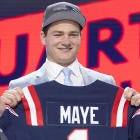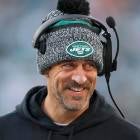Former NFL quarterback Mark Rypien is opening up about his mental health conditions, which he says have been brought about by injuries he suffered playing football. Rypien is best known for winning MVP honors in Super Bowl XXVI and spent most of his Pro Bowl career, which ended in 2002, with the Redskins.
In an interview with KHQ in Spokane, Wash., Rypien revealed he has tried to kill himself, doesn't remember a domestic violence incident, and more broadly speaking, has "been down dark places." He considers the cause to be brain injuries suffered during his football career. He said that his life is "all a blur."
"I suffer from a complex stew of mental health conditions," Rypien told KHQ. "Dark places, depression, anxiety, addictions, poor choices, poor decisions, brought about by dozens of concussions and thousands of sub-concussive injuries from playing this sport."
Rypien said he's only alive today because his wife, Danielle, saved him from an attempted suicide.
"I took 150 pills and a bottle of booze," Rypien said. "If it wasn't for my wife coming home and finding me on the floor, and shoving hydrogen peroxide down my throat, and charcoal, to throw up all these pills, I wouldn't be here today."
When KHQ asked him about a domestic violence incident between Rypien and his wife last year, he blamed it on new medication that he was taking. He also said that he can't even remember that specific night. KHQ reported that the charges were later dropped and the case was dismissed.
"Part of this thing is getting the right medications. When you use something that doesn't address that? That impulse control? You go from zero to 60 very quickly," Rypien said. "I don't remember that night. I remember losing control."
KHQ also asked him about his involvement in a prostitution sting in Spokane in 2012. From their story:
VIGIL: "Did you frequent the spas that were shut down?"
RYPIEN: "What I've done in my life is I've stumbled. I've even falled [sic]. I've tried... what I'm doing, is turning these stumbling blocks into stepping stones."
VIGIL: "Am I to take that as a 'yes'?"
RYPIEN: "I've made poor decisions."
Later, when Vigil asked Rypien whether any of the women he may have been with were underage, he asked to stop the interview and briefly left the room. He returned some minutes later, apologizing that the question was "scary" and it "hit him like a ton of bricks", but said "To my knowledge, in all the years that I've been here, I've never been with an underage woman."
Rypien's comments come after recent studies have shown a link between football and CTE -- a degenerative brain disease that can't be diagnosed until after death. In 2015, a study found that 87 out of 91 deceased NFL players had CTE. In 2017, another study found that 110 out of 111 brains of NFL players had CTE. The league has also seen some players, citing health concerns, retire at a younger-than-usual age while numerous former players like Rypien have opened up about their mental health issues.
As awareness has increased, the NFL has tweaked its concussion policy by giving officials, concussion spotters, and independent doctors more power to pull players out of games, but problems persist. This past season, then-Texans quarterback Tom Savage suffered a scary looking concussion, but was allowed to briefly return to the game while Seahawks quarterback Russell Wilson skipped a mandatory concussion test to return to the field. In an effort to make the game safer, the NFL recently discussed the possibility of getting rid of the kickoff entirely and passed a new rule that prohibits players from lowering their helmet to initiate contact.
Still, the fact remains that football will always remain an inherently violent sport.
"It's a collision sport," Dr. James Andrews told Sports Illustrated in 2016. "If we started a new sport today and we wrote up the rules and regulations and we called it football, they probably wouldn't allow it. We're all trying to do everything we can to make football safer, but that's the way the sport is: There are always going to be injuries. We're aware of that, and we're all working to keep it that way. We want it to continue, believe me."
Rypien, who was the lead plaintiff in a concussion lawsuit that was settled (though many of the players involved say they haven't been paid), criticized the NFL.
"I think (the NFL) is a powerhouse. They're going to tie things up in court. And I truly believe they are going to tie things up in court until people die," he said.
Rypien said his support team -- medication, mental and physical health specialists, and a regular doctor -- "have got me stabilized." He said if he could go back, he wouldn't play football and that he'll donate his brain to science.






















